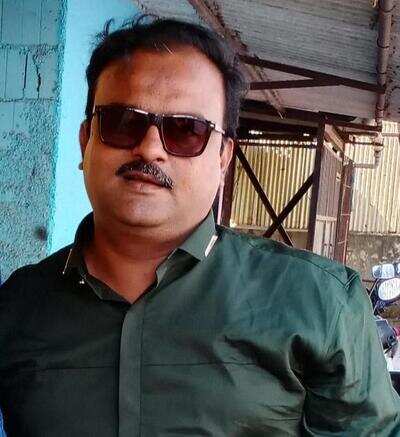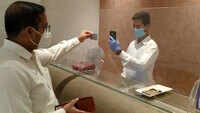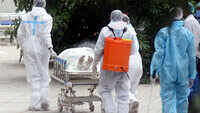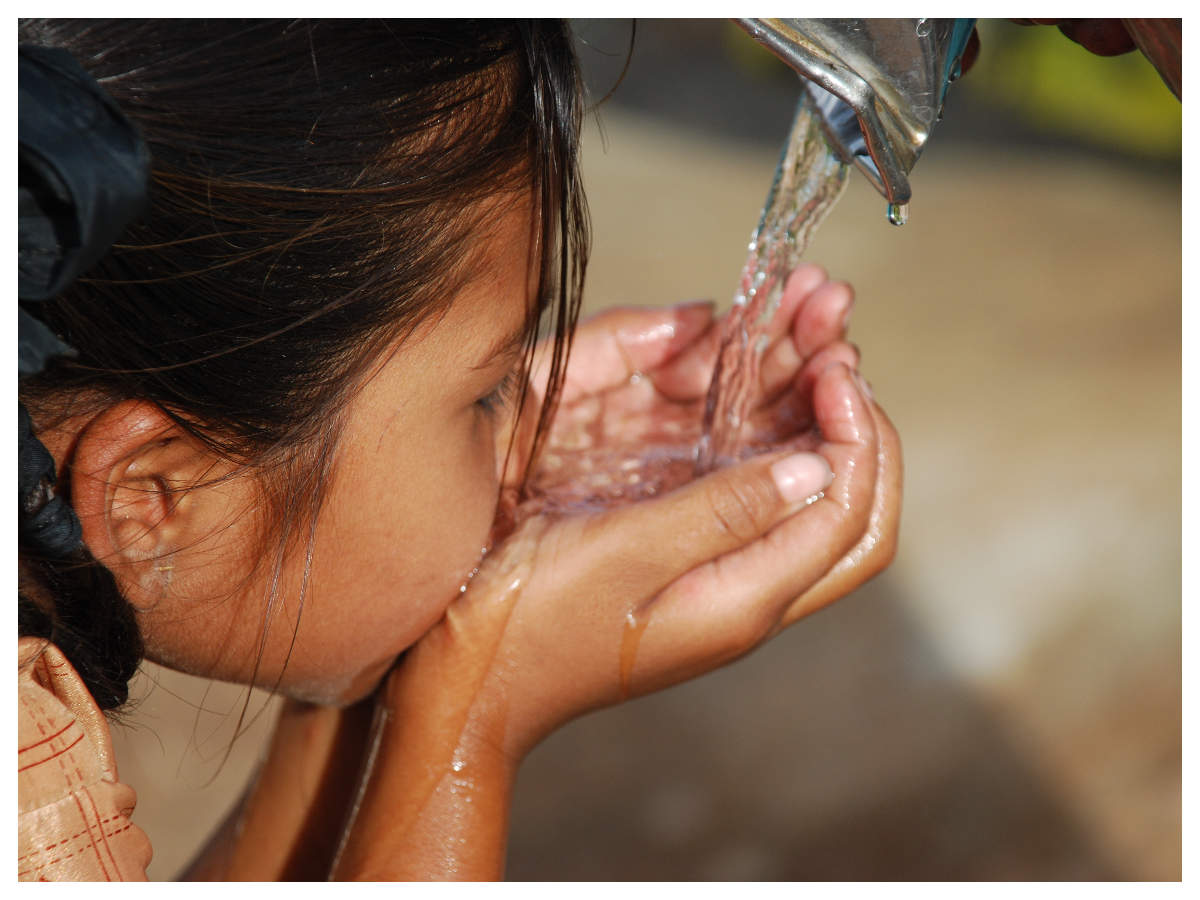
Nagpur: The 42-year-old Khamla businessman, who is the 5th Covid patient to have recovered after testing positive on March 25, became the first from Nagpur to donate his blood plasma under the nationwide clinical trials to check if the fluid can be useful in treatment of Covid-19.
A team of Government Medical College and Hospital (GMCH), which is among 21 institutes authorized to conduct trails by ICMR, collected the businessman’s sample at the Laxmi Nagar-based Jeevan Jyoti Blood Bank on Saturday afternoon.
The process was initiated around a fortnight back when the businessman was contacted by the GMCH team. Several patients in different states have recovered while the therapy has been ineffective in some Covid cases.
Santosh Totwani (he has permitted TOI to mention his name), said he readily agreed to offer his plasma for the trial.
While the GMCH team pleaded confidentiality citing ICMR guidelines as it is a trial, Totwani himself shared his experience with TOI. The GMCH also refused to comment on how and on whom the serum drawn from Totwani’s plasma would be used. On the other side, the Nagpur Municipal Corporation (NMC) shared the number of Totwani’s uncle with the media after he donated the plasma.
Totwani said that his 14-year-old son, wife and elderly mother who too have recovered and spent 28 days after discharge like him, were willingly to offer their plasma.
“As of now, the GMCH doctors told me they would conduct trial using my plasma only,” he said.
As per the ICMR guidelines, the plasma therapy can be used on moderately ill Covid patients.
As on date, the city has eight moderate and two critically ill patients, who are on oxygen support.
Last month, GMCH dean Dr Sajal Mitra had confirmed to TOI that they had shortlisted a couple patients for the trial and were counselling them. Reportedly, some patients were reluctant to offer their plasma.
“Around 20 days ago, GMCH called me to ask if I can donate my plasma. Without a second thought, I agreed for the cause. I believe in community service. They called again and asked me to come over to give a blood sample. It was investigated and found fit for plasma donation,” said Totwani.
On Friday, Totwani was again asked to come to fill up the consent form after which he was given an appointment for Saturday 1am.
As per the ICMR guidelines, the patient has to be symptom-free for 28 days after discharge. Totwani was discharged on April 10 from the GMCH Covid ward.
IGGMCH sources said they too were counselling some discharged patients for convalescent plasma donation.
Some of the Tabligi Jamaat (TJ) members were admitted to IGGMCH in April. Several members have donated their plasma in different parts of the country.
Nagpur Markaz official Maulana Abdullah Mazahiri said they had appealed to all community members to donate plasma though none have confirmed yet.
(BOX)
STEP BY STEP
What is plasma therapy
The method uses antibodies from the blood of recovered patients to treat those undergoing treatment. In these trials, the ICMR has given nod to transfuse the serum only in moderately ill patients.
How effective is the therapy
As per a WHO study, the whole blood collected from patients in the convalescent phase of the infection has been used as an empirical treatment with promising results in a small group of Ebola virus cases. During that outbreak, the entire blood and plasma collected from recovered patients was prioritized for investigation as one of the treatment modalities. Convalescent plasma has been used successfully for the treatment of a variety of infectious agents, the study says.
Who can donate plasma
According to the portal donatingplasma.org, donors must be 18 years of age and weigh at least 50kg. All individuals must pass two separate medical examinations, a medical history screening and testing for transmissible viruses before their donated plasma can be used to manufacture plasma protein therapies.
Are donors screened?
Yes. It’s a pre-donation physical screening verifying medical history, tests for viruses such as HIV, hepatitis and evaluation of protein and haemoglobin levels. In this case, Corona system-free status is also checked.
What plasma works
As per the portal, 500 different types of proteins are found in human blood plasma. Approximately 150 of these may be used for diagnosing disease or manufacturing therapies.
(Sources: WHO, donatingplasma.org)
A team of Government Medical College and Hospital (GMCH), which is among 21 institutes authorized to conduct trails by ICMR, collected the businessman’s sample at the Laxmi Nagar-based Jeevan Jyoti Blood Bank on Saturday afternoon.
The process was initiated around a fortnight back when the businessman was contacted by the GMCH team. Several patients in different states have recovered while the therapy has been ineffective in some Covid cases.
Santosh Totwani (he has permitted TOI to mention his name), said he readily agreed to offer his plasma for the trial.
While the GMCH team pleaded confidentiality citing ICMR guidelines as it is a trial, Totwani himself shared his experience with TOI. The GMCH also refused to comment on how and on whom the serum drawn from Totwani’s plasma would be used. On the other side, the Nagpur Municipal Corporation (NMC) shared the number of Totwani’s uncle with the media after he donated the plasma.
Totwani said that his 14-year-old son, wife and elderly mother who too have recovered and spent 28 days after discharge like him, were willingly to offer their plasma.
“As of now, the GMCH doctors told me they would conduct trial using my plasma only,” he said.
As per the ICMR guidelines, the plasma therapy can be used on moderately ill Covid patients.
As on date, the city has eight moderate and two critically ill patients, who are on oxygen support.
Last month, GMCH dean Dr Sajal Mitra had confirmed to TOI that they had shortlisted a couple patients for the trial and were counselling them. Reportedly, some patients were reluctant to offer their plasma.
“Around 20 days ago, GMCH called me to ask if I can donate my plasma. Without a second thought, I agreed for the cause. I believe in community service. They called again and asked me to come over to give a blood sample. It was investigated and found fit for plasma donation,” said Totwani.
On Friday, Totwani was again asked to come to fill up the consent form after which he was given an appointment for Saturday 1am.
As per the ICMR guidelines, the patient has to be symptom-free for 28 days after discharge. Totwani was discharged on April 10 from the GMCH Covid ward.
IGGMCH sources said they too were counselling some discharged patients for convalescent plasma donation.
Some of the Tabligi Jamaat (TJ) members were admitted to IGGMCH in April. Several members have donated their plasma in different parts of the country.
Nagpur Markaz official Maulana Abdullah Mazahiri said they had appealed to all community members to donate plasma though none have confirmed yet.
(BOX)
STEP BY STEP
What is plasma therapy
The method uses antibodies from the blood of recovered patients to treat those undergoing treatment. In these trials, the ICMR has given nod to transfuse the serum only in moderately ill patients.
How effective is the therapy
As per a WHO study, the whole blood collected from patients in the convalescent phase of the infection has been used as an empirical treatment with promising results in a small group of Ebola virus cases. During that outbreak, the entire blood and plasma collected from recovered patients was prioritized for investigation as one of the treatment modalities. Convalescent plasma has been used successfully for the treatment of a variety of infectious agents, the study says.
Who can donate plasma
According to the portal donatingplasma.org, donors must be 18 years of age and weigh at least 50kg. All individuals must pass two separate medical examinations, a medical history screening and testing for transmissible viruses before their donated plasma can be used to manufacture plasma protein therapies.
Are donors screened?
Yes. It’s a pre-donation physical screening verifying medical history, tests for viruses such as HIV, hepatitis and evaluation of protein and haemoglobin levels. In this case, Corona system-free status is also checked.
What plasma works
As per the portal, 500 different types of proteins are found in human blood plasma. Approximately 150 of these may be used for diagnosing disease or manufacturing therapies.
(Sources: WHO, donatingplasma.org)
Quick Links
Kerala Coronavirus Helpline NumberHaryana Coronavirus Helpline NumberUP Coronavirus Helpline NumberBareilly NewsBhopal NewsCoronavirus in DelhiCoronavirus in HyderabadCoronavirus in IndiaCoronavirus symptomsCoronavirusRajasthan Coronavirus Helpline NumberAditya ThackerayShiv SenaFire in MumbaiAP Coronavirus Helpline NumberArvind KejriwalJammu Kashmir Coronavirus Helpline NumberSrinagar encounter
Get the app








